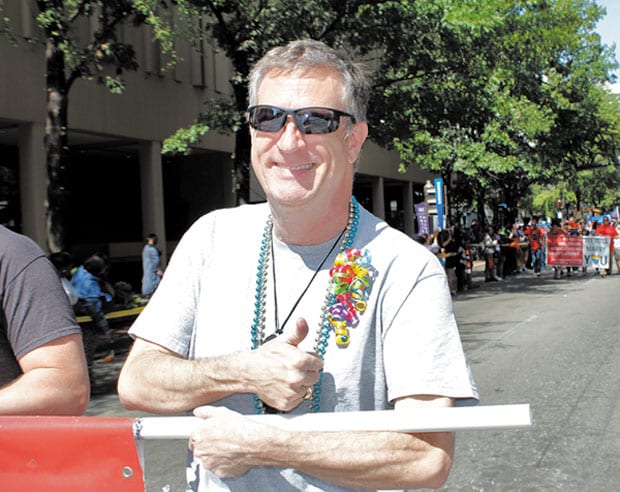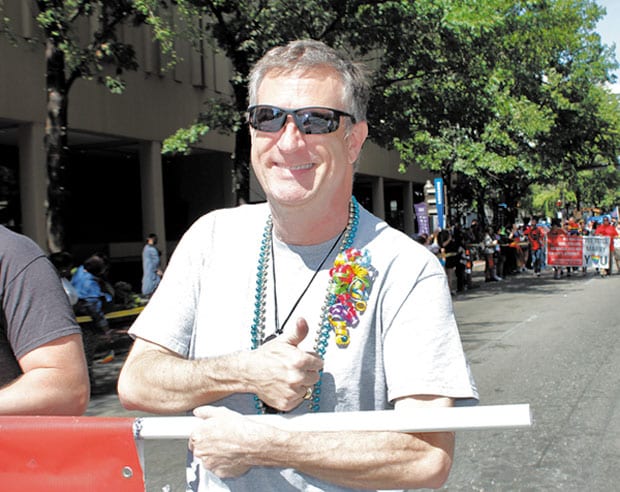David Henderson prepares to hand over the reins of FFW as he concentrates on his personal battle against cancer

David Mack Henderson
Tammye Nash | Managing Editor
David Mack Henderson admits that he is a bit of a “control queen.” But now he finds himself up against a situation even he can’t control.
The long-time activist and Fairness Fort Worth president announced last week that he has stage 4 esophageal cancer. He said he knows he faces a battle where the odds are stacked against him, and when it comes to this disease, the control he treasures will be in short supply.
Still, he’s made up his mind that it won’t control him, either.
Henderson said that after months of ever-building stress, steadily dropping weight and mounting exhaustion, on Aug. 23, he went for tests, looking for the cause. He went to sleep for an endoscopy, and woke up to a diagnosis of stage 4 esophageal cancer.
It started, Henderson said, in the spring when Tea Party darling Lt. Gov. Dan Patrick decided to focus his efforts on forcing the Fort Worth Independent School District to rescind its comprehensive protections for transgender students. Henderson rushed to rally the troops, turning up for meeting after meeting to stand in opposition to Patrick’s anti-trans hate.
In the end, the district’s policy was revised, but not rescinded. “Through all that drama,” Henderson said, “once again quiet, sleepy little Fort Worth showed that we wouldn’t stand for their hate. We proved that we have this coalition that is there, ready to step up and speak out. We showed that we can work pretty quickly, and we can work miracles when the call goes out.
“I remember on May 10, that first [school board] meeting when Dan Patrick came up here, when I came around the corner and saw those 300 or more people standing there in those red shirts [to show support for transgender students], the line going all the way around the building — I almost cried,” Henderson said.
Then came June 12 and the mass murder of 49 men and women in a gay bar in Orlando. It happened in the early morning hours of Sunday, June 12 at Pulse nightclub. By early Monday evening, Henderson had helped the Rev. Carol West and her staff at Fort Worth’s Celebration Community Church organize a candlelight vigil that packed the church to overflowing.
Then there was the so-called preacher in Sansom Park who went on YouTube with a video declaring the victims at Pulse got what they deserved. A group of outraged activists in Dallas began making plans to protest outside his church. Henderson found himself in the middle, he said, urging the activists to move with caution — the preacher had already declared he and his congregation carried guns and weren’t afraid to use them — while at the same time trying to work with Sansom Park police to organize security for the protest.
The rally eventually went on without any problems. But it could have easily gone the other way. “We’re not worried about most everybody who has good intentions,” Henderson said. “It’s our job to worry about those one or two bad actors. You know, everything is fine until somebody shoots a bullet. Then nothing else matters. Whatever the message was that you were sending — it’s gone then.”
Then came July 7 and the attack following a Black Lives Matter rally in Dallas that left five officers dead. And still, the uproar over transgender students continued.
“I was feeling worse and worse and totally worn out,” Henderson said. “Here I was, I could barely swallow, and the press was everywhere, salivating for those of us in Texas to provide trans children for them to interview. I even had calls from BBC. We had become a flashpoint.”
And while he understood the importance of helping create the narrative around this issue, he also knew that many of the transgender children in question came from “underprivileged families and went to tough schools and had negligible support systems in place. I had already come to distrust a number of reports I knew by name. You can bet I wasn’t about to put some 15-year-old kid out there in front of reporters I don’t know, from Georgia or the BBC or wherever.”
The stress continued to build. The weight continued to drop. The fatigue continued to mount. And at the same time, Henderson’s financial resources were dwindling.
“A lot of people think that Fairness Fort Worth has been paying me all along, but that’s not true. Until recently, the only pay I got came from the sensitivity training teaching jobs every now and then,” Henderson said. “In July, I approached the [FFW] board and told them I couldn’t keep going at that pace. I told them, if we want professional advocacy, it needs to be paid. I’ve been doing it for free,” and it was causing his work as a tax accountant to suffer.
“My practice was feeling it,” he said. “I have turned down work because it was more important to focus on activism at that moment. That doesn’t pay my rent. It turns out, that the person paying for it all along was me, and the cupboard was bare.”
The FFW board agreed to begin paying Henderson for his work, but by then his body was letting him know something was really wrong. He had lost about 40 pounds since the spring, and the exhaustion had reached the point where he could no longer ignore it. So he went to the doctor. He had the tests. He received the diagnosis.
His world changed.
“Even this control queen has to let go eventually,” Henderson said with a smile. “It’s time. I have to start taking care of me now and those I call my family. It’s time for me to pass the mantle.”
Henderson said he has spoken with the Fairness Fort Worth board and has arranged to hand over his office and his duties in as orderly a manner as possible.
“It’s time for Fairness Fort Worth to make some decisions about what we want our own advocacy to look like and we’re going to do to create that,” he said, adding that he will be stepping aside as president “no later than the end of November when we would be electing new officers anyway.”
“Plans are in place to responsibly transfer all the accounts, and the banks of knowledge that comes with this job,” Henderson said, “I will help foster the relationships that this is all about, among other things, so this work can continue to grow, exponentially, with the next set of dedicated people ready to step up make the commitment.”
The cancer, Henderson acknowledged, is incurable. “But I am trying to be both an optimist and a pragmatist about this. I need both those things. Whether it’s three months or a year, for whatever time I have left, my plan is to wrap it all up, as best I can, so others can take over and keep going.
“It has been my privilege to serve and to grow, to trip and fall and get back up again with this community,” he said. “And I am proud to say that we are now on solid footing that we didn’t have 10 years ago in Fort Worth. I think this community is ready now to step up to the plate and create a collective legacy with real staying power. Our kids deserve nothing less.”
For more on David Henderson, his history and his legacy, visit DallasVoice.com.
This article appeared in the Dallas Voice print edition October 7, 2016.

